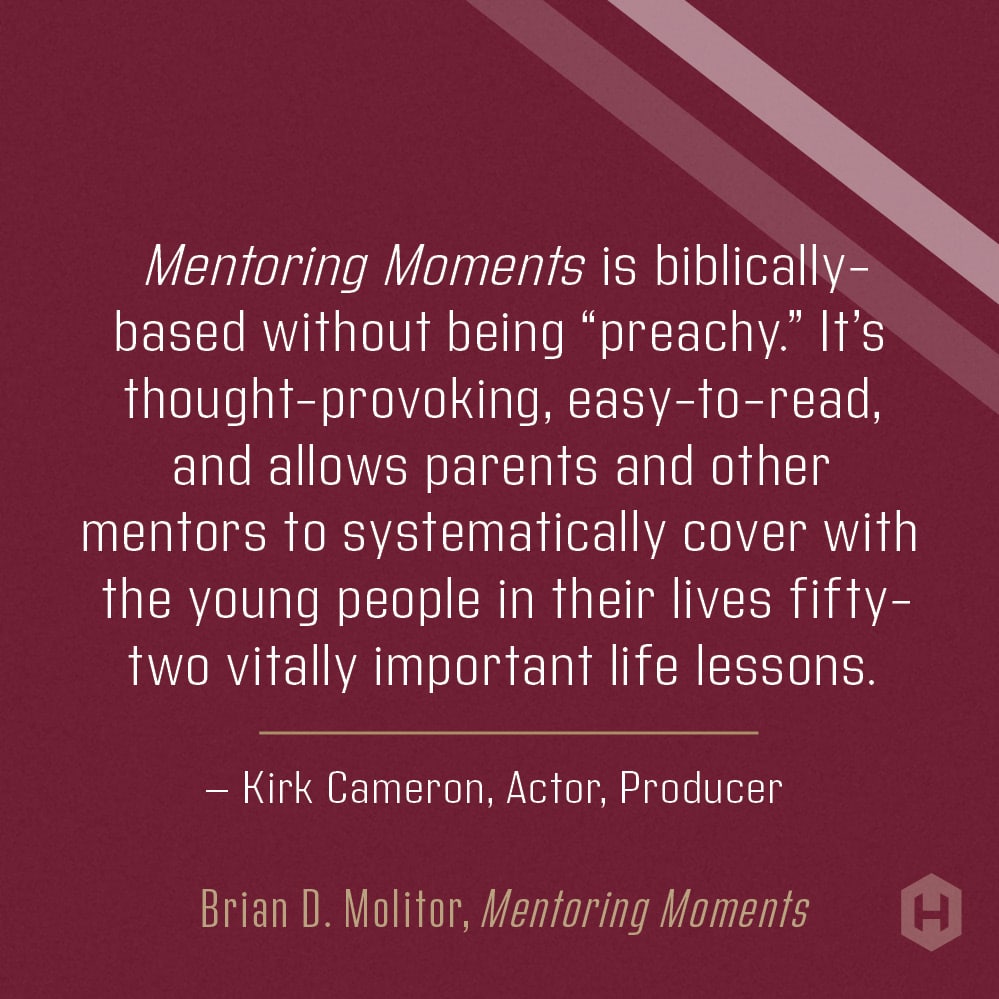With a rapidly changing world today, many wonder, What’s going to happen when the next generation grows up? Some people will see the next generation as a “problem,” but in Christ, we must see any fields which are ripe for the harvest as opportunities.
The next generation presents a sizable opportunity in the coming years.
We have a great opportunity before us, but what can we do? That is, how exactly do we mentor the next generation?
That’s why Brian D. Molitor wrote his new book, Mentoring Moments: Life Lessons for the Next Generation, and why I want to share with you three tips as you mentor the next generation. What follows is not a comprehensive field guide for this topic, just three things I think are important. As a millennial, this is what I see as important for us to do for my generation and the next:
1. Truly listen
When kids are very young, you as the mentor do most of the talking and teaching, but as they get older make sure your ears are keenly tuned in to kids.
I learned the importance of listening from my parents, who did a great job of listening to me (especially during hard times when I needed it most).
So I say to parents and mentors today: Listen well to your kids. Listen to everything they say as you learn who they are, what they want, and what they’re thinking. Even create environments where they share precisely what they’re thinking—and they can do it without fear of unnecessary condemnation from you. Just because they say it in front of you, doesn’t mean they’re right or that you need to correct them.
Let them talk.
Because they often need you to listen before they want you to speak. Perhaps even more than the Gen Xers and the Boomers before them, they feel like they need to be heard in order for you to speak effectively into their lives. Plus, when you listen, then you’ll be able to nuance your communication as you talk with them. But first, comes nuancing your thinking.
Learning to think differently is hard work, but it’s vital because culture is increasingly nuanced.
2. Nuance your thinking
Previous generations simply needed someone to say, “This is true,” for them believe it! But in a postmodern age of “disinformation” and confusion about truth, people today have lost most trust in authority, so whether or not we like it, we’ve got to earn the next generation’s trust in our authority. Just because we’re given a position of authority—as a mom, dad, teacher, pastor, or even counselor—that doesn’t necessarily mean they see it that way.
In fact, many don’t respect someone just because of their position anymore.
We’re living in an increasingly decentralized world, which applies to information, corporations, and organizations, yes, but it also applies to authority. It’s decentralized sometimes to the point of disintegration.
So in order to earn the right to speak, we’ve got to nuance our thinking. Also remember that the issues coming at the next generation are very nuanced.
What I mean is this: If you don’t learn to dance with the next generation (even if you’ve never heard their rhythms before), you just might lose them. If they don’t think you understand them and how they see the world, you won’t gain their ear.
Now, I will say, the most important thing we can do is to love the next generation, but even love itself is being redefined. So we’ve got to enter the fray and let the love of God in us become incarnational love. We can do this by better understanding and contextualizing the eternal truths we find in Scripture.
So listen and nuance, and then you’ll be able to speak more effectively.
3. Speak the truth in love
At some point, if we’re consistently listening and honing our thinking, we will speak—and often.
Volume of words is the name of the game in the growing world of content, because for every one word we speak, they’re hearing many more words from the world (whether through friends, media, or social media).
So speak the truth in love, which means that you truly engage with their arguments (as irrational as they might seem to you), their worldview, and their perspectives. While the rationales of the next generation may seem like complete hogwash, it’s not hogwash to them. It’s their lens through which they see everything, and in order to help them clean it up you’ve got to see it from their point of view.
But we’ve got to speak. As we speak—no, before we speak!—pray the Lord gives us the words to say and the right heart to do so.
As we learn to speak into our kids’ lives (or simply into the life of a member of the next generation over whom you have some influence), utilize great tools like the new book Mentoring Moments by Brian D. Molitor (foreword by Kirk Cameron). This book contains 52 short life lessons to help you mentor young people. It’s intensely practical and is a great way to listen, engage in conversation, and even read a short Scripture together. It’s focused on practical wisdom with accompanying relevant Scriptures.
It can be used by parents, coaches, pastors, mentors, teachers, or any role model who wants to influence a young person.
You know what to do and now you have a tool to help you know how to mentor and even disciple the next generation. Order the book here.
By the way, those are just three things from me. What about you? What are your tips about mentoring the next generation?

